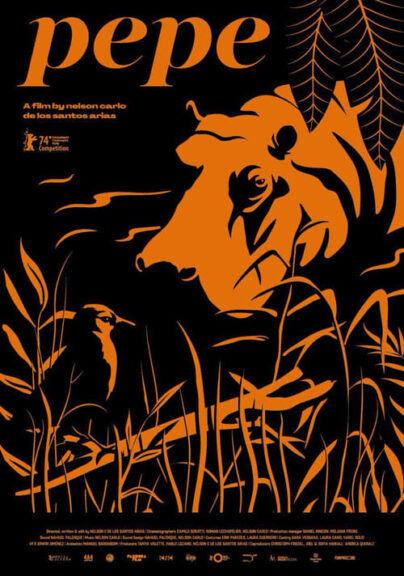
A film by Nelson Carlo de los Santos Arias
With: Jhon Narváez, Sor María Ríos, Fareed Matjila, Harmony Ahalwa, Jorge Puntillón García, Shifafure Faustinus, Steven Alexander, Nicolás Marín Caly
A voice that claims to be from a hippopotamus. A voice that doesn’t understand the perception of time. Pepe, the first and last hippo killed in the Americas, tells his story with the overwhelming orality of these towns.
Our rate: **
A film with a very abstract and intriguing concept, which frustrates to the extent that it sometimes succeeds. The process, the angle of attack, is strongly inspired by an ambitious documentary and artistic approach. Nelson Carlo de los Santos Arias clearly aims to speak to us about Colombia, a daily truth, a state, a society, still marked by the Escobar years and the cartels’ stranglehold on society, by giving voice to hippos brought to Colombia from Namibia. By sharing with us some of the science behind the Hippopotamus, he also mirrors what Melville brought out in Moby Dick: a myth, a mountain, an ultimate danger that mesmerizes those who set out to hunt it. Pepe (the film) also plays on a cartoon character, Pepe the friendly hippopotamus, who makes children laugh, just as it inexorably places the figure of Pablo Escobar at the center of the documentary (or fictional) approach, since among the various hippopotamuses featured, one is called Pepe, the other Pablito. In much the same way as Bresson did with Au Hasard Balthazar, Pepe’s ambition is not to highlight man’s deadly sins, but rather the problems that plague his country: militarism, poverty, machismo, totalitarianism, lack of infrastructure and development, education problems and a blocked future… He gives a voice to the local misses as much as to the hippos, and never forgets to offer us some pretty cinematographic shots, when flying over Namibia or following the Amazonian rivers. But the whole thing is uneven, far too stretched out, and the few captivating and magical moments captured here and there struggle to form an easily perceptible whole. The film loses itself in its concept: it creates an expectation, gives hopes and clues, but never manages to fill it perfectly, or to concretize its good documentary ideas into a more tangible emotion or reflection. Something is clearly happening, but something is also missing. By repeating itself too much, by saturating itself with sound experimentation to fill in images that would have been very difficult to obtain, by getting too lost in the paths it follows, Pepe remains nothing more than an interesting essay that misses its target, at least in this first part.

